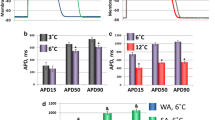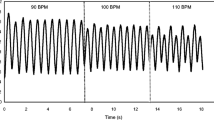Abstract.
Temperature strongly affects oxygen solubility in water, oxygen convection in the blood and locomotor activity of the fish. Since oxygen supply and demand are temperature dependent, it was hypothesized that the purinergic control of the heart, one of the most important mediators in oxygen-limited conditions, might also show temperature dependence. Therefore, the present study examines the effects of adenosine (Ado), a purinergic agonist, on the contractile and electrical activity of the thermally acclimated trout (Oncorhynchus mykiss Walbaum) heart. The fish were acclimated to either 4 °C or 17 °C and the experiments were conducted at the acclimation temperatures of the animals. In spontaneously beating hearts, Ado had a negative chronotropic and a positive inotropic effect in warm-acclimated rainbow trout while no response was detected in cold-acclimated trout. In paced atrial and ventricular preparations, Ado had a negative inotropic effect in both warm- and cold-acclimated fish, and the response was strongest in the atria of warm-acclimated trout. Ado shortened the duration of contraction 12–14% in atrial preparations but had no effect in ventricular muscle. Ado (10–4 mol l–1) increased the density of the inwardly rectifying K+ current from –3.5±0.6 pA pF–1 to –8.4±1.4 pA pF–1 (at –120 mV) in atrial myocytes of warm-acclimated trout but was without effect in atrial myocytes of cold-acclimated trout (–2.4±0.8 pA pF–1 vs. -2.1±0.9 pA pF–1). Ado had no effect on K+ currents of ventricular cells in either acclimation group. These results indicate that the effects of Ado on cardiac contractility and electrical activity are stronger in warm-acclimated than in cold-acclimated trout when measured at the physiological body temperatures of the fish. The balance between oxygen demand and supply of the heart might be better in the cold where more environmental oxygen is available and the power of the muscles is weaker thereby reducing the need for the purinergic control of the heart. Temperature-dependence of Ado response in the trout heart warrants that temperature should be taken into consideration when the purinergic system of the ectotherms is studied.
Similar content being viewed by others
Author information
Authors and Affiliations
Additional information
Electronic Publication
Rights and permissions
About this article
Cite this article
Aho, .E., Vornanen, .M. Effects of adenosine on the contractility of normoxic rainbow trout heart. J Comp Physiol B 172, 217–225 (2002). https://doi.org/10.1007/s00360-001-0245-9
Accepted:
Issue Date:
DOI: https://doi.org/10.1007/s00360-001-0245-9




